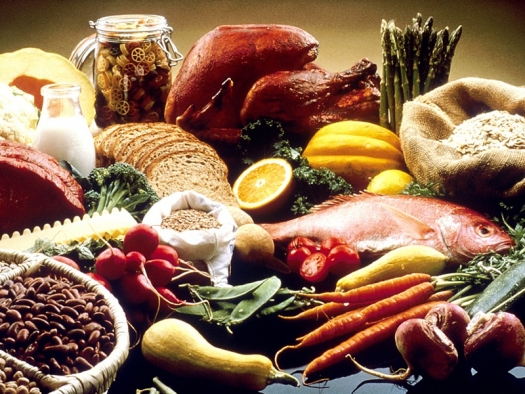FoodsToReducePain.jpg

Photo by FotoshopTofs / CC0, Pixabay.com
Research shows that foods and drinks that reduce inflammation can reduce chronic pain and improve your mood. Avoiding foods and drinks that cause inflammation can also help. In fact, changing your diet and lifestyle can allow you to work with your health care team to reduce the amount of medication you take or even stop taking it. Even small changes, such as switching to whole grains and eating more fish and less red meat, can make a difference in your health. Here are some suggestions for simple nutritional changes that can help you start feeling better.
Types of foods that reduce inflammation
- Whole grains: Whole grain bread, oats, brown rice, barley, bulgur, quinoa, couscous, polenta, and rye bread. You can also switch to whole wheat tortillas and pasta. You can use potatoes, sweet potatoes and plantains in recipes the same way as whole grains. Avoid having these fried very often because fried foods can cause inflammation.
- Beans, nuts, seeds and plant foods that have a pod, such as peas: Black beans, kidney beans, garbanzos (also called chickpeas), white beans (also called navy beans or cannellini beans), hummus, nuts, and seeds. Nuts can include walnuts, almonds, pecans, and peanuts. Seeds include sunflower seeds, pumpkin seeds, pine nuts and more. Peas and soybeans are a type of plant called a “legume” that comes in a pod. You can eat sugar snap peas, regular peas, roasted soy nuts, edamame and any type of tofu.
- Fruits: Berries, pomegranates, and cherries. Dark-colored fruits are especially good for preventing inflammation. Avoid drinking fruit juice or drink a small glass and mix it with an equal amount of water. Fruit juice contains a lot of sugar, which makes inflammation worse.
- Vegetables: Yellow, orange and red peppers and tomatoes. Spinach, chard, kale, leaf lettuce, romaine lettuce, arugula (rocket or roquette) and mixed greens, especially dark, leafy greens. Purple and green cabbage, onions, garlic, broccoli, Brussels sprouts, and cauliflower. Radishes, cucumbers, green beans and green onions (scallions).
- Olive oil: Use this instead of butter and other oils for cooking foods, when possible. You can use flavored or extra virgin olive oil in dips and dressings.
- Fish: Choose fish that lived in cold water, including salmon, herring, anchovies, sardines, and mackerel. Wild salmon is healthy to eat, but farmed salmon is not because it usually has a lot of antibiotics in it. Look for recipes using fresh sardines, herring, and mackerel, or buy them canned from the supermarket.
- Chicken, turkey and other birds: Eat white meat chicken and turkey. Avoid frying or deep frying except as a special treat. Game birds such as pheasant and quail, and farmed birds such as Cornish hens, are fine to eat.
- Eggs, cheese, and yogurt: Low-fat or skim milk, yogurt, natural cheese (not processed cheese such as cheese slices or spreads). Some people do not digest cow’s milk, you can buy milk that does not include lactose (milk sugar) or avoid milk altogether. Check labels on yogurt to avoid brands with a lot of added sugar.
- Herbs and spices: Cinnamon, ginger, turmeric, garlic, rosemary, cayenne pepper, black pepper.
- Tea: Black tea, green tea, white tea, herbal tea.
- Chocolate: Choose dark chocolate with 70% cocoa or higher. Eat 1 or 2 ounces per day.
- Wine: If you drink, you may have ½ to one (1) drink each day if you are a woman, and 1 to 2 if you are a man. Wine can help reduce inflammation but limit the amount you drink to avoid causing other health problems. Some doctors and researchers believe it is better to avoid drinking any alcohol at all.
Foods to avoid or eat less of
- Red meat, such as beef — if you do eat beef, have it only on special occasions. Grass-fed beef is the best, but it costs more than regular beef, so you might want to plan for it in your grocery budget. Eat less of other beef, including hamburgers, steaks, ribs, and beef in tacos, stir-fry, and sandwiches.
- Processed meat, such as ham, bacon, sausage, and lunch meat
- Certain oils and fats, including margarine, shortening, lard, and oils from soybean, safflower, corn, and sunflowers
- White bread
- Rice and corn cereals and instant oatmeal
- Instant or white rice, packaged stuffing
- Foods with high-fructose corn syrup
- Soda, including diet soda, fruit juice and other drinks with added sugar, such as energy drinks and coffee or tea drinks with flavorings
- Also avoid or eat fewer sweets, especially processed sweets. These include cookies, cakes, pastries such as muffins, donuts, brownies, pies, and other sugary desserts.
So, what you eat and drink can reduce both the fat and fat cells and the inflammation from them. This means it can reduce the amount of pain you have. As a side benefit, eating foods that stop inflammation can also reduce obesity, so your body becomes healthier over time.
For more information, check out the Guide to Nutrition for Chronic Pain.
12 Foods You Should Eat to Reduce Chronic Pain was originally published on Dr. Wayne Jonas' website, March 5, 2019.


